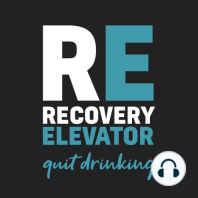47 min listen
RE 223: Let Authenticity Replace Positivity
ratings:
Length:
51 minutes
Released:
May 27, 2019
Format:
Podcast episode
Description
Alex, with 63 days of sobriety, shares his story. On today’s podcast Paul talks about what researchers, that studied the drinking habits of people that work with the public, discovered. They found that employees that forced themselves to smile and be happy around customers were more at risk to heavier drinking after work. Because of this, employers may want to rethink their ‘service with a smile’ policies. Employees that work with the public may be using a lot of self-control, so later these employees may not have enough self-control to regulate how much they drink. Faking, or suppressing emotions, is called surface acting, which is also linked with drinking after work. Overall it was found that employees that interacted with the public drank more after work than those who did not. Try not to suppress your emotions. Emotions are just that, emotions. They are not good or bad. It’s okay to be authentic in the work place. The best way to be authentic is with eye contact. Authenticity replaces positivity. SHOW NOTES [13:45] Paul introduces Alex. Alex is 34 years old. He lives in Sandy, UT, where he was born and raised. He is married and has a 3-year-old son. He works in information technology and is a captain in the Army National Guard. For fun Alex likes anything outdoors. He enjoys skiing, camping, glamping and also plays the guitar and drums. [16:20] Give us a little background about your drinking. Alex joined the military and started drinking at age 21. He describes his drinking as like a frog in a slow boil. Around age 30 drinking really started to affect his health. His hangovers were getting worse. He was having unexplained pains where his liver was located and experiencing a shortness of breath. [20:45] What was your anxiety like? He was worried about things a normal person wouldn’t be worried about. In October 2017 he went to his doctor and was finally honest about his anxiety and depression…but not with his drinking. In January of 2018 he decided to do a dry January so hit the booze hard leading up to it. [25:45] What was it like on January 1st? At day 15 Alex found the podcast and started binge listening to it. He realized he was like the people on the podcast, that he was an alcoholic. At day 32, after making it through ‘dry January’ he drank. That started a 2-week bender. [30:56] During that 2-week bender did you try to stop? He got a case of the ‘fuck-its’ and that 2-week bender was just everyday hammering the alcohol. He then just realized that he wasn’t being the person he wanted to be. [32:40] Talk to us about after you had that moment of clarity. The most important thing for Alex was being very honest with himself about the fact he is an alcoholic and needs to stay away from alcohol. He made an appointment with his doctor and told him about his drinking. His doctor referred him to therapy. [37:37] How are you going to get day 64? He says he needs to keep busy. He goes to a climbing gym. He drinks sparkling water if he feels like he needs something in his hand. [39:42] What have you learned about yourself during this alcohol-free journey? He’s returning to who he wants to be. Most importantly he’s learned how to be honest with himself. [44:00] Rapid Fire Round Worst memory from drinking? All the times I made my wife feel like shit. Do you remember a specific ‘oh-shit’ moment? A year after my son was born, I was having suicidal thoughts. What’s your favorite resource in recovery? Definitely this podcast. In regards to sobriety what is the best advice you’ve ever received? To think about the positives instead of the negatives. What parting piece of guidance can you give to listeners? Know that you are lying to yourself and start being honest with yourself. You might be an alcoholic if... You count the half 16oz. flat warm 9% beer from the night before as inventory for
Released:
May 27, 2019
Format:
Podcast episode
Titles in the series (100)
005: You've got to be kidding me, he's an alcoholic also?: When I found out one of my brother's best friends is an alcoholic I was blown away; an a little upset that we hadn't connected years before so we could have been working together. Here are some of the resources that Elliot likes. Joe and... by Recovery Elevator ?
